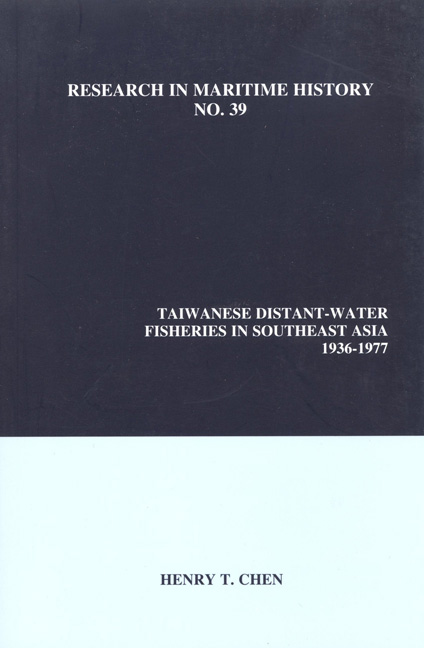Book contents
- Frontmatter
- Contents
- List of Tables
- List of Illustrations
- Notes on the Sources
- About the Author
- Acknowledgements
- Introduction
- Chapter 1 Japan and the Development of Taiwan's Fishing Industry
- Chapter 2 The Revival of the Fishing Industry in Postwar Taiwan
- Chapter 3 Kaohsiung Fishing Port and Its Fishing Ancillary Industries
- Chapter 4 The Taiwanese Fishing Industry and the Military-Political Complex
- Chapter 5 The Kaohsiung Fishing Industry and Its Ancillary Industries
- Chapter 6 The Development of Kaohsiung's Fishing Companies
- Chapter 7 Daily Lives at Sea, Fishing Zones and Politics
- Chapter 8 The Culture and Daily Life of the Kaohsiung Fishing Communities
- Chapter 9 The 1970s Crisis in the Taiwanese Fishing Industry
- Conclusion
- Appendix 1 List of Informants
- Select Bibliography
Chapter 4 - The Taiwanese Fishing Industry and the Military-Political Complex
- Frontmatter
- Contents
- List of Tables
- List of Illustrations
- Notes on the Sources
- About the Author
- Acknowledgements
- Introduction
- Chapter 1 Japan and the Development of Taiwan's Fishing Industry
- Chapter 2 The Revival of the Fishing Industry in Postwar Taiwan
- Chapter 3 Kaohsiung Fishing Port and Its Fishing Ancillary Industries
- Chapter 4 The Taiwanese Fishing Industry and the Military-Political Complex
- Chapter 5 The Kaohsiung Fishing Industry and Its Ancillary Industries
- Chapter 6 The Development of Kaohsiung's Fishing Companies
- Chapter 7 Daily Lives at Sea, Fishing Zones and Politics
- Chapter 8 The Culture and Daily Life of the Kaohsiung Fishing Communities
- Chapter 9 The 1970s Crisis in the Taiwanese Fishing Industry
- Conclusion
- Appendix 1 List of Informants
- Select Bibliography
Summary
Taiwan's postwar fishing industry was for a long time closely controlled and monitored by the government and the military. This level of state intervention directly affected the fishing companies and their activities at sea. Indeed, it was so exceptional that it deserves to be examined in some detail. In this chapter I focus on the relationships between the industry and the government, military and other politicians. Initially, I discuss the appointment of the heads of the fisheries authorities and show how the government kept the fishing industry under surveillance with the aid of the military. I then illustrate the nature of the interactions between the fishing industry, the military and the Kuomintang (KMT) government to show the kind of approaches the government and military used and the ways in which the fishing companies responded. In the last part of the chapter I will consider the issue of who could actually speak on behalf of the fishing industry given the level of government control. To provide part of the answer, I will examine the contributions of the parliamentarians towards the development the fishery. At the same time, I will discuss the strategies that the postwar industry in Kaohsiung used to increase its influence in governance and public affairs.
Military Control over the Fishing Authorities and the China Fishing Company (CFC)
Taiwan's fishing industry had close links with the military under the KMT regime. This unusual relationship was established for two important reasons. First, the offshore fishers were the only occupational group that could regularly leave Taiwan and contact people from China. Their mobility was considered a potential threat to Taiwan's political stability in the early postwar years. As a result, the government, especially the military intelligence branch, felt compelled to keep the industry under strict surveillance. Further, trawler fleets working off the Chinese coastal provinces needed naval escorts for safety. The government also believed that marine products would be a reliable food source for the military. In return, the fishing industry recognized that the military was an important and stable market for its products.
In order to monitor the fishing industry, high-ranking military officers were appointed to manage Taiwan's fisheries authorities. The most important of these in the early postwar years was the Taiwan Fisheries Production Committee ([Taiwan Yuye Zengchan Weiyuanhuei], or TFPC), which existed from 1951 until 1958.
- Type
- Chapter
- Information
- Publisher: Liverpool University PressPrint publication year: 2009



